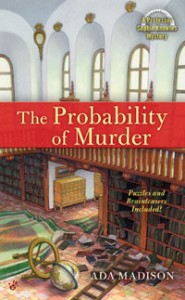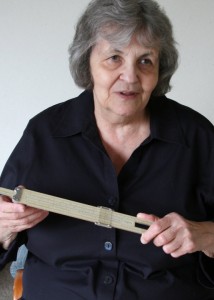My friend, the fabulous Camille Minichino, joins us today for the launch of her latest book. For a chance to win a copy leave a comment for Camille. One lucky winner (in US only, please) will win.
Camille, your second book in the wildly successful Professor Sophie Knowles Series is being released today. Congratulations! Give us the elevator pitch.
Thanks for this great opportunity, Diana. It’s always fun to visit your blog!
The pitch: In “The Probability of Murder,” Sophie Knowles, college math professor and puzzle-maker, is stunned when her friend, Charlotte, the college librarian, is found murdered in the limited access stacks. It takes Sophie’s sharp sleuthing to unearth the secret, stretching back two decades, that led to her friend’s murder. My website, www.minichino.com has a full synopsis.
Tell us a little about how you came to write the Professor Sophie Knowles Series.
I’m turning every phase of my life into a mystery series. I’ve done my physicist era, my miniatures hobby; it was time to do the college math teacher career. There are still six more phases, so be ready.
They say to write what you know and I KNOW you like math – LOL. Tell us about Sophie Knowles. Share three things that you and Sophie have in common, and three ways in which you’re absolutely different.
And I know YOU like math, Diana, and you’re going to pass that on especially to your daughter!
Sophie and I love to teach. Often I’ve learned something just so I could teach it—from miniatures to making muffins to physics.
Sophie and I both love doing and making up puzzles. My husband and I often make up puzzles for each other.
One of Sophie’s contributions to her department is based on my early days teaching undergraduate physics, when I hosted monthly birthday parties for famous mathematicians and scientists. I’d put the students in charge of preparing a bio of the person and a demonstration of her or his work. And there’d be cake.
But Sophie’s personal background is very different from mine. Sophie is ethnically neutral and fondly remembers her parents, whereas I grew up in a very Italian neighborhood and . . . well, that’s another story! Also, Sophie’s dress size is in the single digits.
Does Sophie get into any trouble in the book that you’ve been in yourself? Does she do something you wouldn’t do in a million years, no matter the benefits?
Yes to both! I’ve managed to turn every upset in my life into fiction. I’ve been called into college presidents’ and deans’ offices more than once for exactly the reasons Sophie has—well, except for the investigating a murder bit (that’s the “not in a million years” part). For example, in “The Square Root of Murder,” the dean reprimands Sophie for wearing sandals to class; I was once chided for wearing what we then called slacks to class. In each case, I try to make the point that college administrators should be focusing on more important matters.
What was the hardest part of writing Professor Sophie Knowles Series? Is that always the hardest part for you, or does it change from book to book? What about the easiest or most fun part?
The hardest part for me in any novel is unrolling the plot so that everything comes together in a satisfying way: laying out clues that are obvious-but-not-obvious, leading the sleuth to the “aha” moment in a believable way, avoiding too-stupid-to-live and the big confession dump by the killer at the end. After 16 books, plus 3 in the pipeline, I’m considering making an outline first for the next one, but—nah—it’s more fun to wing it and stress out near the end.
I love building the characters. And it’s easy for Sophie and her crew, since I’ve been hanging around college campuses on the East and West Coasts for decades. At the moment I’m on the faculty of Golden Gate U. in San Francisco, and I want to say that absolutely NO character or plot thread is based on a student, faculty member, administrator, janitor, mailroom clerk, living or dead, on that campus.
Similarly for the other two series. For Gloria Lamerino—my research was working in a science lab environment for many years, and we share the same ethnicity and roots in Revere, Mass. For Geraldine—easy because I have been and still am a miniaturist, playing with dollhouses and tiny furniture in secret.
What has most surprised you about being a writer?
The camaraderie among writers and readers. I thought only physics and math were people-oriented fields where everyone worked together, shared knowledge, and joked a lot.
 If you could give one piece of advice to the pre-published writers reading this, what would it be, and why?
If you could give one piece of advice to the pre-published writers reading this, what would it be, and why?
Be patient with the process, with both the writing and the publishing business. If I could give two pieces of advice, the second would be: Get a degree in marketing.
